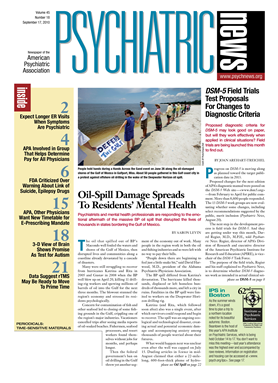People with serious mental illness earn, on average, one-third less than the median income of people without serious mental illness throughout the world.
This grim finding has emerged from a study conducted in 19 countries—10 high-income and nine low- and middle-income. The pattern applied to all countries studied.
“I was surprised at how large the effect is and the fact that it was found in many countries,” Ronald Kessler, Ph.D., told Psychiatric News. Kessler, senior author of the study, is a professor of health care policy at Harvard Medical School.
Mental health surveys were carried out in population samples from Belgium, Brazil, Bulgaria, Colombia, France, Germany, India, Israel, Italy, Japan, Lebanon, Mexico, the Netherlands, New Zealand, Nigeria, the People's Republic of China, South Africa, Spain, and the United States. A total of more than 100,000 respondents participated. These were the largest coordinated series of cross-national psychiatric epidemiological surveys ever undertaken—in fact, the first such surveys conducted in some of the countries.
All of the surveys used the World Health Organization Composite International Diagnostic Interview (CIDI), a structured diagnostic instrument that evaluates respondents for mental disorders according to DSM-IV and ICD-10 diagnostic systems. It considers anxiety disorders; mood disorders; disorders of impulse control such as bulimia and intermittent explosive disorder; adult persistence of childhood-adolescent disorders such as attention-deficit/hyperactivity disorder, conduct disorder, and oppositional-defiant disorder; and substance use disorders. All interviews were carried out face to face by trained lay interviewers.
Illness Severity Assessed
CIDI respondents found to have mental disorders were further interviewed to determine the severity of their conditions. Serious mental illness was defined as satisfying at least one of the following criteria:
•.
meeting criteria for bipolar I disorder or substance dependence with a physiological dependence syndrome,
•.
having made a suicide attempt in conjunction with a psychiatric disorder,
•.
reporting at least two areas of severe role impairment due to a psychiatric disorder, or
•.
reporting overall functional impairment at a level consistent with a Global Assessment of Functioning score of 50 or less in conjunction with a mental disorder.
Since the CIDI does not include questions to assess the presence of schizophrenia, Psychiatric News asked Kessler whether this omission posed a problem for their study since he and his colleagues were interested in evaluating the earnings of people with serious mental illness. “Our experience is that the vast majority of people with psychosis score positive on our measure of serious mental illness despite the fact that psychosis is not measured in this study,” he explained. “So we are capturing these people.”
Survey participants who were found to have a mental disorder were also asked what their earnings during the previous year had been.
Kessler and his team then focused on some 45,000 of the approximately 100,000 survey respondents aged 18 to 64—the prime working years in most of the countries studied—and whose gross earnings during the previous year were known. Of the 45,000 respondents, about 1,500 were found to have a serious mental illness. The researchers then compared the earnings of respondents with serious mental illness with those of the other respondents.
Earning Disparities Were Substantial
The researchers found that seriously mentally ill people earned one-third less, on average, than people whose mental illness was not considered to be serious in both high-income countries and in low- and middle-income countries. Their data also showed that the total amount of potential earnings lost by seriously mentally ill people in high-income countries equaled 0.8 percent of the total amount of money earned by all working people in those countries.
For comparison, this loss in earnings is roughly equivalent to the planned investment in infrastructure under the American Recovery and Reinvestment Act, the economic-stimulus bill that President Obama signed into law on February 17, 2009, the researchers noted. So “mental disorders are associated with massive losses of productive human capital not only at the individual level ... but also at the societal level in the [surveyed] countries,” they asserted.
Because of the cross-sectional nature of the study, the researchers were not able to prove cause-and-effect between serious mental illness and reduced earning potential. They also were not able to evaluate whether treatment for a serious mental illness—or lack of such treatment—had an impact on earnings. They do suspect, however, that serious mental illness, whether treated or untreated, does lead to reduced earning potential. Thus, the most important take-home message from these findings, Kessler told Psychiatric News, is that “mental disorders have substantial adverse societal effects. These effects are so large that they suggest that aggressive outreach for detection and treatment might make sense for employers.”
The study's results were published in the August British Journal of Psychiatry. It was funded by health and mental health agencies in the various participating countries.

